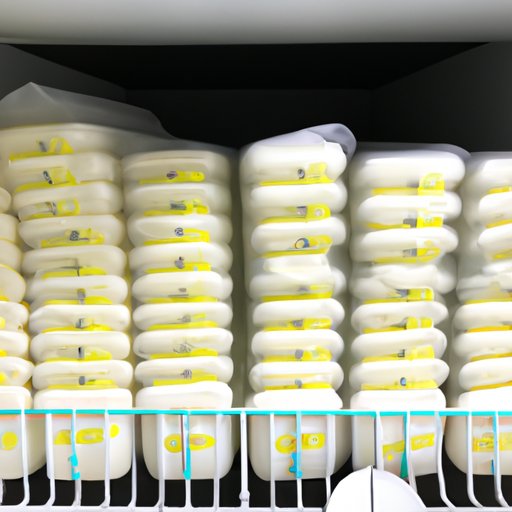
Introduction
As a new mother or father, ensuring that your baby has access to breast milk around the clock is a top priority. However, unexpected events like a busy schedule or a sudden need to travel can prevent you from nursing your little one when needed. One solution to this problem is to express breast milk for later use. But is it possible to freeze refrigerated breast milk? This article will explore the ins and outs of this topic, including a step-by-step guide for safely freezing refrigerated breast milk and important safety considerations.
Storing Breast Milk
The optimal storage temperature for breast milk is in a refrigerator at a temperature between 32°F (0°C) and 39°F (4°C). However, the storage duration will depend on factors such as the temperature of the refrigerator, how clean the containers are, and the temperature at which the milk was initially collected. Generally, freshly expressed breast milk can be stored in a refrigerator for up to five days.
It is important to recognize the difference between refrigeration and freezing. While refrigeration can preserve the quality of breast milk, it does not kill the bacteria present in the milk. Freezing breast milk, on the other hand, can kill most bacteria, but it may also cause changes in the milk’s quality, such as the breakdown of certain proteins.
Step-by-Step Guide to Freezing Refrigerated Breast Milk
Although freezing refrigerated breast milk is a simple process, it is important to follow a few guidelines to ensure that the milk is still safe for your baby to consume. Here are the steps:
- Ensure that the breast milk is fresh and has not gone bad.
- Clean the storage container using soap and hot water, then rinse and air dry.
- Pour the breast milk into the container, leaving at least an inch of space at the top as the milk will expand when frozen.
- Label the container with the date the milk was collected.
- Place the container at the back of the freezer where the temperature is most consistent.
When it’s time to use the frozen milk, you can thaw it gently in the refrigerator overnight or use warm water to defrost it quickly. Avoid using a microwave as it can heat the milk unevenly and destroy valuable nutrients that benefit your baby.
Pros and Cons of Freezing Refrigerated Breast Milk
There are both pros and cons to freezing refrigerated breast milk, and as a mother, you will need to decide whether it is the right choice for you and your baby. One of the most significant advantages of freezing breast milk is that it can help you build up a supply of milk for use on days when you cannot nurse. It can also be handy for working mothers who need to pump and store their milk for later. On the downside, freezing can cause a loss of vitamin C and some of the enzymes present in the milk, which are essential for your baby’s health.
Before deciding to freeze your breast milk, consider the shelf life of your milk. Freshly expressed milk is always a better alternative and should be your first choice. Keep in mind that breast milk will need to be heated gently to avoid bacteria, which can occur during storage and impact your baby’s health over time.
Safety Considerations
When it comes to storing and freezing breast milk, there are some safety considerations to keep in mind. For example:
- Wash your hands before expressing or handling breast milk to prevent contamination.
- Choose appropriate storage containers that are free of BPA and other harmful chemicals.
- Do not combine freshly expressed milk with previously refrigerated milk, as this can increase bacteria growth.
It is always best to err on the side of caution when it comes to your baby’s health, so if you are unsure about any of these considerations, consult your pediatrician for advice.
Limits of Freezing Refrigerated Breast Milk
While freezing breast milk can be a convenient way to maintain a good supply of milk for your little one, it is important to know that frozen milk should be used within a certain period. A good rule of thumb is to use the milk within six to twelve months, as it will start to lose quality after that time. It is also important to note that breast milk that has gone bad can have harmful bacteria that could make your baby sick. Always check the color and smell of the milk before using it.
Conclusion
Freezing refrigerated breast milk is a convenient way to have breast milk on hand for your baby when nursing is not an option. However, following appropriate hygiene protocols and storing techniques is critical to ensure the safety and quality of the milk. Remember to thaw it safely and check the color and smell before giving it to your baby. If you have any questions about storing and freezing breast milk, consult your pediatrician for more detailed advice.




